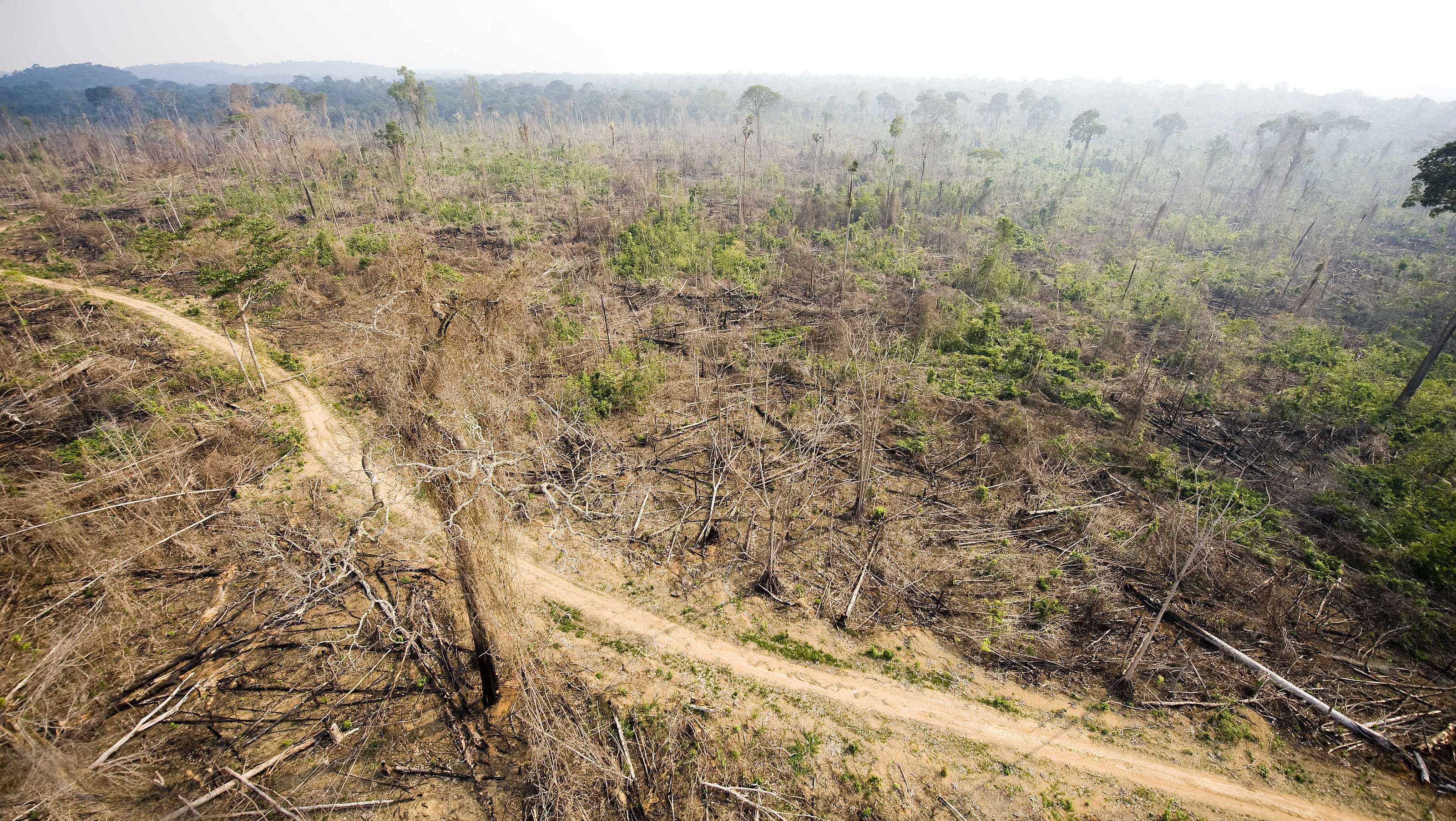
Massive forest loss scars Brazil’s Amazon region.
Report: Global Deforestation Rose 4% in 2022
Dimming Hopes of Ending Forest Loss by 2030
John Cannon / Mongabay
(October 30, 2023) — The spike indicates rates are trending “in the wrong direction,” Erin Matson, a lead author of the Forest Declaration Assessment, said during an Oct. 19 press call.
“The question that comes to mind is why?” said Matson, who is a senior consultant at the Netherlands-based advisory company Climate Focus. “The answer becomes obvious when you look at what we invest in. We are investing in activities that are harmful for forests at far higher rates than we are investing in activities that are beneficial for forest.” Clearance for food and feed crops like soybeans, as well as for pastureland for cattle, drives most tropical deforestation.
The annual assessment, released by a group of civil society and research groups Oct. 23, compares progress toward commitments to forest conservation made by countries and the private sector, including the 2030 goal, with “baseline” deforestation rates from 2018-2020. At the 2021 United Nations climate conference (COP26) in Glasgow, United Kingdom, 145 countries pledged “to halt and reverse forest loss and land degradation by 2030,” after a similar commitment, the New York Declaration on Forests from 2014, missed its initial target of halving deforestation by 2020.
The 2022 Forest Declaration Assessment found that deforestation had diminished in 2021, even as observers noted the need to cut back on deforestation more quickly for the benefit of biodiversity and human communities, as well halt the release of climate-warming emissions. Recent research demonstrated that carbon emissions from tropical forests, where the bulk of deforestation occurred in 2022, have doubled since the early 2000s.

The backslide that occurred in 2022 is “disappointing,” Matson told reporters.
Globally, 6.6 million hectares (16.3 million acres) of forest were lost, the report found. That’s an area of land larger than Sri Lanka. Nearly two-thirds of that loss — 4.1 million hectares (about 10.1 million acres) — came in “irreplaceable” old-growth and primary forests, and that figure is 33% higher than what’s required to stay on pace for the 2030 goal.
Matson said the 2023 Forest Declaration Assessment also looked more closely at forests outside the tropics than previous reports. While deforestation is less of a problem in northerly boreal and temperate regions, degradation caused by logging and wildfire is.
“Where they’re still standing, they’re losing carbon, losing their structural integrity, losing biodiversity year after year,” she said. “We never talk about [degradation], but it’s hugely important.”
Fran Price, global forest practice lead with WWF, said the Glasgow Leaders’ Declaration on Forests and Land Use “really gave us hope.”
“That was a moment of coming together around forests,” Price said on the press call. “Now we need to continue that momentum.”

WWF released the first Forest Pathways Report, also on Oct. 23, which is aimed at providing a “global blueprint” to help the world’s forests recover.
No tropical region is making the necessary progress to stop deforestation by 2030, the Forest Declaration Assessment found. Still, more than 50 countries around the world are on pace to stamp out deforestation by the end of the century. Indonesia and Malaysia, for instance, have managed to cut deforestation across several years, which has helped the Asia region remain closest to staying on track.
Brazil, with more tropical forest than any other country on Earth, has ramped up enforcement to address its rising deforestation rates, spurred in part by a change in the country’s leadership, said Darragh Conway, lead on rights and governance for the Forest Declaration Assessment, at the briefing.
“The renewed investment in implementation of forest laws and respecting Indigenous rights since President [Luiz Inácio Lula da Silva] returned to power in Brazil has led to sharp drops in Amazon deforestation,” Conway said. “This showcases what could happen when countries with good laws on the books actually invest in enforcing them.”
Investments in activities that harm forests, which Matson and her colleagues figure is at least $500 billion per year, far outstrips the $2.2 billion in public money going to “green” initiatives. Stopping deforestation by 2030 will likely require annual green financing of $460 billion, she added.
Another issue is the amount of money that reaches communities, said Edegar de Oliveira Rosa, director of ecosystem conservation and restoration at WWF Brazil.
“I feel that what was committed in the past is far away from what we are seeing coming to the ground to help fight deforestation, but also create a new way of development for these regions,” Oliveira said during the briefing.

Indiginous peoples are the frontline defenders of ancient forests.
Communities continue to struggle to access even funding aimed specifically at supporting their conservation efforts. Overall, Indigenous and other forest communities receive far less than 1% of all climate finance, according to research from Rainforest Foundation Norway.
“Governments equally need to involve citizens and communities in developing and implementing these laws and commit to respecting and protecting the rights of Indigenous people and local communities who have proven themselves time and again to be the most effective forest stewards we have,” Conway said.
To get back “on track,” deforestation must decrease by more than 27% in 2023, Matson said.
Authors of the two reports released them ahead of meetings they say offer the opportunity to recalibrate society’s relationship with forests. The Three Basins Summit, a civil society-led meeting that begins Oct. 26, will focus on forest restoration in Africa, Asia, Latin America and the Caribbean. Meanwhile, the U.N. climate conference, COP28, starts Nov. 30 in Dubai, United Arab Emirates.
“We know that it’s impossible to reverse nature loss, to address the climate crisis and to develop sustainable economies without forest,” Matson said. “We don’t need new forest goals. We need uncompromising ambition, speed, and accountability by both governments and businesses to fulfill their existing goals.”
Posted in accordance with Title 17, Section 107, US Code, for noncommercial, educational purposes.